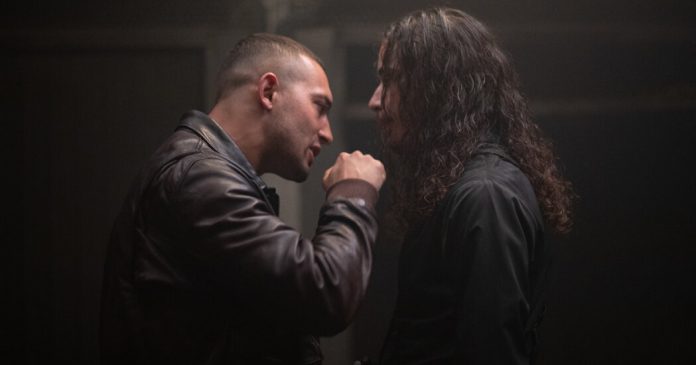“Athena” begins in a state of most stress and escalates from there. An offended crowd has gathered exterior a police station close to a high-rise housing challenge within the suburbs of Paris. A video of the killing of an area teenage boy, apparently by uniformed officers, has gone viral, igniting long-smoldering resentments. Violence breaks out shortly, and earlier than lengthy, the speak on social networks and information broadcasts shall be forecasting not civil unrest, however outright civil battle.
On the middle of the maelstrom, spinning in numerous instructions, are the slain teenager’s three surviving brothers. Adbel (Dali Benssalah), the primary one we encounter, is a soldier within the French Military, not too long ago returned from fight in Mali. He’s contained in the police station when the difficulty (and the film) begins, and his lengthy stroll to fulfill the demonstrators exterior symbolizes his predicament. He’s pulled aside by conflicting loyalties, caught between the facility of the state and the craze of the streets.
His brother Karim (Sami Slimane) is a militant chief within the means of changing into a navy commander as protest accelerates towards armed battle. With weapons and automobiles seized from the forces of regulation and order, Karim and his military of younger males stage a small-scale revolution, taking management of the courtyards and corridors of Athena, the high-rise advanced the place they’ve grown up in poverty and alienation.
One other brother, Moktar (Ouassini Embarek), is a drug vendor whose enterprise is disrupted by the chaos. He and his associates are attempting to get out of Athena whereas Karim is making an attempt to lock it down and Adbel, more and more determined and fewer and fewer safe in his convictions, is making an attempt to calm the state of affairs.
Fraternal melodrama and social turmoil present gasoline for relentless motion. In precept it’s not a foul method, and “Athena,” directed by Romain Gavras from a script he wrote with Ladj Ly and Elias Belkeddar, will not be shy about evoking gangster films, traditional westerns and classical tragedy, investing its modern story with brutal, archaic energy.
Gavras’s filmmaking is technically spectacular. He pulls the digital camera by means of advanced, kinetic tableaus in lengthy, breathless takes. A few of these sequences are thrilling, however after some time they turn out to be repetitive, and Athena feels extra like a online game background than an precise place. There’s no modulation: Practically each scene ends in both a screaming argument or a literal explosion. Karim and Moktar not often utter a line with out shouting. Abdel is extra of a brooder, at the least for some time — Benssalah has a clenched, melancholy watchfulness that holds your consideration within the midst of all of the noise — however ultimately he begins yelling, too.
There are different characters: a younger riot policeman (Anthony Bajon) who’s taken hostage, and a terrorist mastermind (Alexis Manenti) who’s coaxed out of retirement to affix Karim’s rebels. Their presence complicates the plot, and amplifies the movie’s hectic, hectoring gestures towards topical urgency. However just like the three brothers, these secondary figures are sociological composites, inserted right into a fastidiously diagramed, finally incoherent narrative scheme.
You could possibly argue that “Athena” makes use of the syntax of motion cinema to make a degree in regards to the state of French society. And whereas it’s true that there are actual points at play right here — police violence, racism, the disaffection of the immigrant underclass — the filmmakers don’t a lot discover as exploit them, giving a loud and sloppy style train a patina of relevance.
Athena
Rated R. Nonstop violence. In French, with subtitles. Working time: 1 hour 39 minutes. Watch on Netflix.


